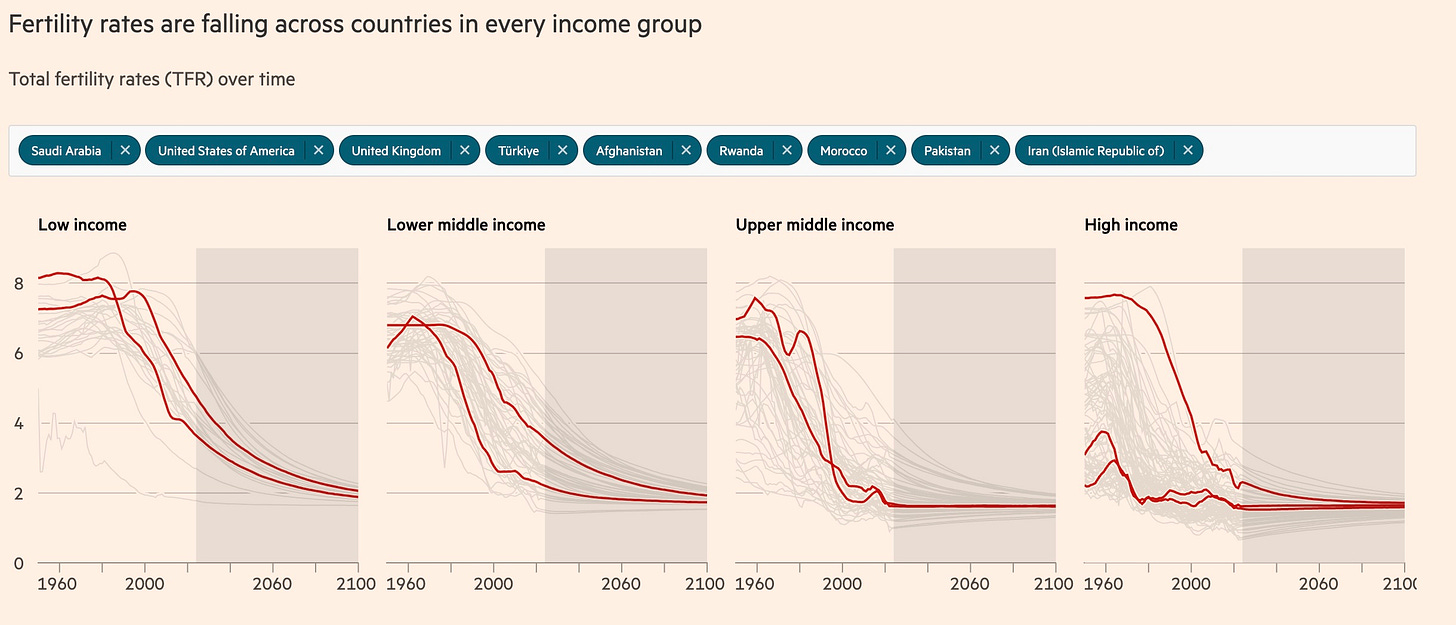Welcome to Gilead
Moar-babiez! Gender and women's empowerment are out. Baby making and families are in.
Given the international focus of this Substack, many of my readers are DC based, working in the government or with it at an NGO—and given my own history at the State Department, so many of you are long time friends. Team Interruptrr sees you and honors you. Thank you for your service.
It’s Aquarius season. Lots of birthdays… for now, happy birthday dear Lina, Frank, and Kate!
Happy Lunar New Year! It’s the year of the snake. 🐍
And this is a regular note I’m leaving here. As Substacks and newsletters, especially by men, proliferate, likes are important. It is all about the algorithm. If you like this newsletter and what we do, please click the 🖤 above and share with other. If you ❤️ it, please become a paid subscriber. It goes to the amazing women who help me put it together. Let’s have an alternative to the Curtis Yarvins, Joe Rogans, and Andrew Tates of the world.
Mentions of gender and women’s empowerment have been scrubbed from USAID’s website. This comes after Donald Trump issued an order to pause foreign assistance for 90 days, so that his administration can ensure that all programs align with his policy objectives. This is straight out of Project 2025, which clearly lays out that gender needs to be purged from USAID’s work.
Eliminating gender and women’s empowerment tracks with Trump’s vitriol towards diversity, equity, and inclusion—and, frankly, disdain for women and, as Alona Ferber notes, his desire to seek vengeance for the #MeToo movement during his first term and the numerous sexual assault allegations against him. Gender and women’s empowerment are out. Women and “families” are in. This shift isn’t merely happening as an act of revenge. It’s part of a broader ideological push—one that sees declining birthrates as an existential crisis.
Welcome to Gilead.
Worldwide, birthrates have been on the decline. The FT published a graphic this week that shows the drop in fertility rates across all global income groups. Whether in Afghanistan, Pakistan, Iran, Rwanda, Turkey, or the US, women are not having babies.
As Emily Peck writes, “in most ways, the decline in the birthrate is a good news story.” It is “a result of improvements in health care, science and education and equality.” Babies are surviving and investing in their education and well-being.
But, while birthrates are on the decline, the world’s population continues to grow. According to the UN, the global population will grow another 2 billion over the next 60 years. It is expected to “peak” at 10.3 billion by the mid 2080s. That’s due to something called demographic momentum, the continued population growth that occurs even after birth rates decline, because of a critical mass of young people.
Yet, a number of men, are sounding the alarm that without more babies we’re doomed. A number of studies show that decreasing birthrates threatens future economic growth. Fewer people means fewer workers and fewer consumers. More concerning, however, is that as the population ages, we will have more older people and fewer younger ones, putting pressure on the social safety net. Who takes care of the elderly?
In September, Liz Essley Whyte reported on the rise of the pronatalism movement on the right—conservatives who are concerned about the birthrate and “eager to implement policy and cultural solutions to the problem.” A leading figure in that movement: Elon Musk.
Musk, a father of 12, has said that “a collapsing birthrate is the biggest danger civilization faces by far.” Last summer he posted that he would “give” Taylor Swift a child. In an extensive profile of Musk’s baby obsession, Sophie Alexander and Dana Hull note that Musk isn’t just talking—he’s funding research, such as the Population Well Being Initiative at the University of Texas at Austin, and backing policies aimed at influencing who has children, and how many. Musk’s racist rants are well documented.
An obvious solution to a declining population is boosting immigration. That is something Japan has reluctantly embraced. Yet, in the US, as we’re witnessing, migrants are being driven out and immigration stalled. For Trump, Musk, and MAGA, the “population crisis” isn’t just about numbers—it’s about ensuring that the “right” people are reproducing.
There is a long history of concern about who is having babies—and “who ought to be.” Alexander and Hull note that Teddy Roosevelt, “routinely encouraged Anglo-Saxon Americans to have more children, warning of a “race suicide” if the country’s WASPs failed to keep pace with Catholic immigrants. In a new book, Predatory Data: Eugenics In Big Tech And Our Fight For An Independent Future, Anita Say Chan “traces the through-line between the nineteenth century's anti-immigration and eugenics movements and our sprawling systems of techno-surveillance and algorithmic discrimination.” It is no coincidence that prominent white men are pushing the “manosphere” and embracing the “tradwife” trend.
In his first term, Trump boasted about being responsible for overturning Roe v. Wade and reproductive freedoms. Now, he’s taking aim at DEI and remote work, much to Musk’s delight. The president has shut down diversity offices and initiatives, which obviously hurt women (along with people of color, the disabled, LGBTQ+). Indirectly, he has called for the federal workforce back into the office five days a week. With the high cost of childcare, that puts difficult choices before a parent or parents, especially those at the lower end of the income scale. Perhaps that’s the point.
On January 24, Secretary of State Marco Rubio announced that the US would join the Geneva Consensus Declaration on “promoting women’s health and strengthening families.” Expect that a revamped USAID and foreign assistance and policy approach will double down on “the family.” There will be no childless cat ladies.
Where else have we seen this? In every authoritarian run state: Russia, China, Turkey, Iran, Hungary.
In Turkey, Recep Tayyip Erdoğan called women who reject motherhood “incomplete,” urging them to have three children. China’s leaders have labeled unwed, childless women as “leftover.” In Russia, Vladimir Putin has said that motherhood is the “amazing destiny” of women. All target LGBTQ+ and transgender rights—anything that stands in the way of women procreating.
Erasing gender and women’s empowerment isn’t about the supposed failures of DEI, improving efficiency or ensuring that US tax payer money is well spent—it’s about control and social engineering. Simplistically, it is depriving women from opportunity and choice, throwing up so many obstacles that we’ll just give up and give in. That’s where they’re so f**g wrong. — Elmira
I’m opening up my column to others. Please pitch me your op-ed idea/perspective. Let’s get more female perspectives. Email me on endeavoringe@gmail.com or respond to this post.
Elsewhere in the World.....
On our radar...
Foreign Aid Halt
The Trump administration may come to regret its “stop work” order, writes Dafna Rand, especially as it relates to national security priorities such as anti-trafficking, counternarcotics, and security assistance. (Just Security)
The Tech Wars: China v. the US
DeepSeek struck fear across Silicon Valley and Wall Street this week. The Chinese AI LLM, large language model—essentially what ChatGPT is, spooked markets after it released its chatbot that seems to be as good as, if not better than Open AI’s ChatGPT, and was built using fewer microchips and less investment. Yeah, no need to pour in billions into tech bros. US President Joe Biden tried to slow down China’s AI advancement with export controls on semiconductor exports. Lizzie Lee on the limits of that strategy. (The Wire China)
Colombia v. Trump
Last weekend, Colombia’s president, Gustavo Petro, turned away a military flight full of deportees from the US, noting that they had been mistreated. Trump quickly fired back that he would level tariffs on the South American ally. Petro backed down. But before you call it for the Donald, Whitney Eulich says that this is just the start of a longer fight. (Christian Science Monitor)
US
Does the US owe Afghans who supported its efforts a safe haven? Cristina Maza, who authors the terrific Lazo Letters, talks to an Afghan who is caught in the mire of Trump’s immigration ban. (National Journal)
As Trump carries out his vow to remove migrants from the US, Shannon O’Neil warns that it will not fix border issues. Instead it will destabilize Mexico and exacerbate threats to both countries. (Bloomberg)
If RFK Jr. gets the votes and becomes the secretary of health and human services, global health will be jeopardized, writes Angela Rasmussen. (Foreign Policy)
Corrupt criminals unite! Bibi is coming to town next week to meet with Donald Trump, reports Barbara Tasch. (BBC)
Africa
Et tu, Rwanda? A Rwandan rebel group, M23, has moved into eastern Congo and taken it over. Congo’s president, Felix Tshisekedi, says that it is a violation of his country’s sovereignty. That’s correct, writes Michelle Gavin, who points out that the region is a hotbed of instability. (CFR)
Asia
The chief prosecutor of the International Criminal Court has requested arrest warrants for two senior leaders of Afghanistan’s Taliban government. The charge is “crimes against humanity of persecution on gender grounds.” While it’s unlikely that either will be apprehended, Rachel Reid and Roxanna Shapour say that it may increase international pressure on Afghan leaders. (Afghan Analyst Network)
The Americas
Donald Trump has come out swinging against Latin America. He has previously said that the southern hemisphere needs the US more than the US needs them. Lucía Dammert outlines ten areas that are key to understanding how Latin America and Trump 2.0 navigate the next four years. (Americas Quarterly)
Middle East
Yes, Donald Trump did say that Gaza should be cleared out. That’s not only a war crime, writes Annelle Sheline, it will further destabilize the Middle East. (Responsible Statecraft)
On Gaza, the fight for justice is far from over, writes Laila el-Haddad. (The Hill)
What did the world learn from Syria? That we should listen to the people on the ground, writes Alia Malek. (NYT)
Europe
Protests have rocked Serbia for the past few months. They started in November, following the collapse of a roof at a train station in Novi Sad, a city north of the capital Belgrade where 15 people died. The tragedy wasn’t the trigger, but growing discontent over corruption and neglect at the hands of the current right wing government led by Aleksandar Vučić. This week, his prime minister, Miloš Vučević resigned. That is unlikely to satisfy the protestors who are calling for Vučić to step down. Nina Miholjčić Ivković explains why that is unlikely to happen. Serbia’s president has been working to undermine democracy. (Balkan Insight)
Trump hasn’t had time for Ukraine yet. But Europe shouldn’t sit idly by or “wishing” a miraculous US reengagement, writes Nathalie Tocci. It’s time to step it up Brussels. (WPR)
Last Sunday, Belarus, Russia’s little authoritarian ally, held elections. No shocker, the incumbent dictator, Alexander Lukashenko, won. Thirty-one years in power and still going. Daria Dergacheva notes that while exit polls showed he had 87.6 percent of the vote, Lukashenko said he received 86.8, coming in under Vladimir Putin who garnered 87.28 percent last year. (Global Voices)
Opportunities
Reuters is taking applications for its Journalism Fellowship through February 13.
The Economist is taking applications for its Science and Technology Internship through February 28.
The New Public, a new model for digital participation, has a number of jobs open.
The MERL Tech Initiative is looking for a part-time AI+Africa Lead.
Bookclub Alert! Lourdes Martin, who pens Please, Do Tell, is reading Reading Lolita in Tehran this month. Join her for a virtual discussion on February 27.
Conference Alert! NatSecGirlSquad is hosting its annual conference from March 17-18 in DC. Interruptrr is proud to be a partner. Interruptrr readers get a 25 percent discount at checkout with code: Interruptrr!
Editorial Team
Elmira Bayrasli - Editor-in-Chief







